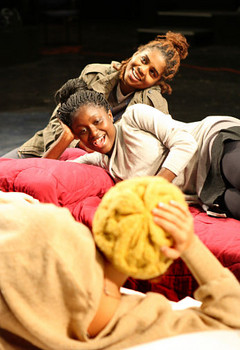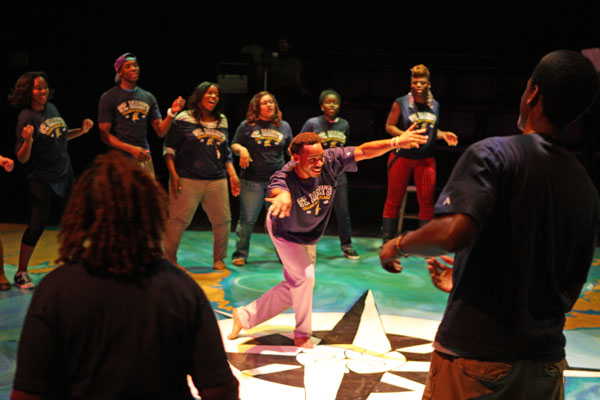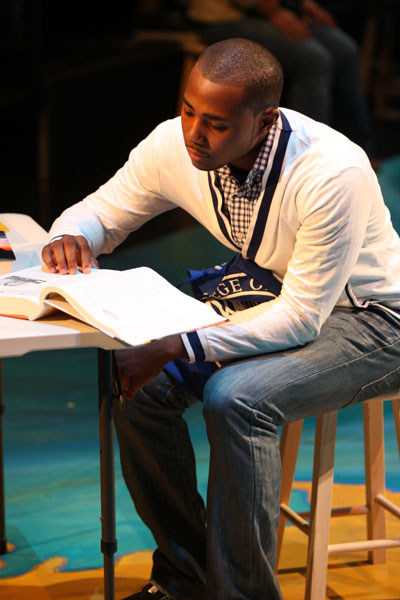|
Jacqueline Lawton: How long have you lived and worked as a playwright in DC? What brought you here? Why have you stayed?
Caleen S. Jennings: I moved to D.C. in 1983. I started working as a playwright here in the mid 80’s. We’d lived in New York City, and then spent a year working in Lagos, Nigeria. We had a four year old son and we had often talked about moving out of the city. We knew if we moved back to NYC from Lagos, we’d never leave. We decided to move to D.C. because it put us closer to my family and closer to better public schools. D.C. has been a wonderful artistic home for me. I was embraced by Black Women Playwrights and Source Theatre Company almost immediately. The artistic community was so non-territorial and open-minded. I can’t imagine living and working anywhere else. I love the interplay between the universities and the professional arts community. I love the ease with which D.C. artists make connections between their “job-jobs” and the arts. I love the variety of kinds of theatres here and the generous spirit of the arts community. JL: Have you ever been a member of a DC area playwrights writing group? If so, did you find it useful? Would you recommend that other playwrights join them? CSJ: Yes. Black Women Playwrights was the first organization to embrace me and my work. It has been a major force for nurturing talent in D.C. and it’s great to see them expanding to the national arena. I have been formally and informally affiliated with Playwright’s Forum for many years. Ernie’s done a fabulous job of making this a playwright’s town. There’s a community of very fine writers here – creative, intellectually sharp, driven, generous. The Playwright’s Forum conferences have been pivotal in my development. Washington Women in Theatre has done staged readings of 7 or 8 of my pieces – it’s been a support and inspiration to my work. Definitely. Playwrights tend to be lone wolves but interaction with others who are as insane as you are, and who can exchange ideas and techniques is essential for growth. D.C. organizations are particularly generous about sharing information regarding various kinds of opportunities as well. JL: In DC, we have the Capital Fringe Festival, the Intersections Festival, the Source Theatre Festival, the Kennedy Center's Page-to-Stage Festival, the Black Theater Festival, and the Hip Hop Theatre Festival. We also have the Mead Lab at Flashpoint Theater Lab Program. Have you participated in any of these? Yes. If so, can you speak about your experience? CJS: I was part of the old Source Theatre gang with Pat Murphy Sheehy, Keith Parker, Joe Banno, Lisa Middleton and crew. They were my first artistic home and Pat’s and Lisa’s efforts helped me receive the Kennedy Center’s Fund for New American Plays Award. I won two awards in Source Festivals in the early 90’s. Kennedy Center’s Page-to-Stage Festival has done readings of two of my plays and I’m part of this year’s D.C. Playwright’s Slam. I participated this past year in the Intersections Festival and loved it so much that I’m doing a project in next year’s as well. I had a reading this past year in the Black Theatre Festival and I was very impressed by the director’s work on my play. Washington Women in Theatre have done staged readings of 3 of my plays in conjunction with the Mead Lab at Flashpoint Theatre. I fear I’m too long in the tooth for the Capital Fringe and Hip Hop Theatre Festivals, but there may be life in the old girl yet. Stay tuned. JL: What kind of work do you do to pay the bills? How do you balance this work with your writing? CSJ: I have taught theatre at American University for the past 24 years. Prior to that, I was a freelance focus group moderator and trainer, a children’s theatre teacher, and an ad writer for a suburban newsletter. When I was freelance I was also mother to young children. There was no such thing as “balance”. I wrote in short bursts when I had time. I wrote some of my best children’s plays when I was teaching young people at the Bethesda Academy of Performing Arts (which is now Imagination Stage). Bonnie Fogel, Janet Stanford and Kate Breyer encouraged me as a playwright and a teacher. When I transitioned into academia, writing became part of my requisite scholarly/artistic output. I find teaching tremendously stimulating. There’s nothing like teaching playwriting to make you walk your talk. I try to stay in process on a piece while I’m teaching the course. That way I’m writing along with my students – having the same experiences and finding ways to problem solve. I think that this makes me a better teacher and a better playwright. It also makes me constantly read new books on the art of playwriting. Can’t beat that! I have premiered a number of plays at AU. There’s nothing like the intensity of writing, directing, producing your own work in front of and with your students. It holds your feet to the fire. It forces you to create and adhere to best practices. Is there time to do all the writing I want? Of course not. I’m grateful for my sabbatical every seven years but can anyone do everything they want to do? Of course not. But I’ve never felt as if my teaching interfered with my writing process. Would I give up teaching to write full time? Of course not. What I’ve learned over the years is that when a play is burning in your brain and in your gut, you’ll make the time to write it. JL: How many plays have you had produced in the DC area? Were any of these plays self-produced? CSJ: Eight. No. JL: If you could be produced at any theatre in DC, which would it be and why? CJS: Arena Stage because I’d be honored to be in the company of some of the outstanding playwrights they have produced. I must also say Round House Theatre because their artistic staff is outstanding and because Montgomery County is my home. JL: DC audiences are ... CSJ: ... sharp and intellectually curious. You have to come with your A-game as a playwright. Many Washingtonians have seen theatre all over the world so they hold you to high standards. Theatre goers who work here and retire here expect theatre to provoke and provide fresh perspectives. From Woolley to Folger to Studio to Synetic – each has a fiercely passionate audience who expects the best. JL: DC actors, designers and directors are ... CSJ: ... Sweethearts! So bright, talented, engaged, daring. The vast majority are here because they LIKE it here. I’ve never encountered one of those “I’d rather be in New York” attitudes. Consequently, they challenge me as a playwright – ask tough questions, broaden my vision. They give 1000% to whatever project they’re engaged in. They are humble and good spirited. I’ve learned a tremendous amount from them. JL: DC critics are ... CSJ: ... Tough. Most are fair. Some don’t know how to be entertaining without being snide or even cruel. The ones I admire are smart about the process of creating art and knowledgeable about theatre and theatre history. Others think they know more than they actually do. I wish they knew that you can write even the most negative review with grace and with constructive criticism that’s well grounded in an understanding of the art form. JL: How do you feel the DC theatre community has addressed the issues of race and gender parity? CSJ: Source, Horizons, and Woolly come to mind as having been leaders in providing opportunities to playwrights of color and to women playwrights as part of their seasons. Arena has made concerted efforts, as has Theatre J. In general, I’ve seen an overall improvement in sensitivity to these issues during the past 29 years I’ve lived here. Despite its economic struggles, ACTCO has done a heroic job in making sure that black theatre is seen in D.C. JL: How has this particular issue impacted you and your ability to get your work produced on the main stages? CSJ: I feel I get passed over because I’m local more so than because I’m a woman or a playwright of color. Horizons, Charter and Source have always championed local playwrights. Theatre J, Round House and Arena have also come on strong for local playwrights in recent years, as have Adventure Theatre and Imagination Stage in children’s theatre. I still get the feeling that some D.C. theatres look over the heads of local playwrights in order to get nationally recognized names like Lynn Nottage, Cheryl West and Lydia Diamond. Make no mistake -- it’s splendid to see their work and to have seen Arena do a play like Trouble in Mind. I celebrate the successes of these women playwrights of color as if they are my successes. I also understand that playwrights with this kind of name recognition get butts in the seats. It would be interesting to know if D.C. artistic directors feel that they’re taking a risk by doing local playwrights. As I said above, D.C. audiences are cosmopolitan and could perceive “local playwright” to mean “provincial” or “unsophisticated”. Are D.C. Artistic Directors worried that some critics might feel this way too? In all fairness, however, I need to be more proactive about marketing and promoting myself to D.C. theatres. I may be speaking from an outdated paradigm. JL: What advice do you have for an up and coming DC based playwright or a playwright who has just moved to D.C.? CSJ: Go to as much theatre and as many talk backs and opening night receptions as you can. Meet local playwrights and talk to them. Usher. Apply to be a Helen Hayes judge. Attend a Playwright’s Forum conference. Most of all, give it time. I think many people arrive from places like New York, Chicago and L.A. and think D.C. is provincial when it comes to theatre. They expect to get produced immediately. D.C.’s way more sophisticated than people expect and each of our many theatres has a specialized mission. Get to know the city, the theatre artists in all disciplines. See at least a season’s worth of work. Get connected to the PEOPLE before you try to promote your work. JL: What's next for you as a playwright? Where can we keep up with your work? CSJ: D.C. Playwright’s Slam as part of the 2012 Kennedy Center Page-to-Stage Festival. On Facebook and via e-mail. I don’t have a website -- it’s that long in the tooth thing again.
0 Comments
Your comment will be posted after it is approved.
Leave a Reply. |
My BlogI'm a playwright, dramaturg, and teaching artist. It is here where you'll find my queries and musings on life, theater and the world. My posts advocate for diversity, inclusion, and equity in the American Theatre and updates on my own work. Please enjoy!
Categories
All
Archives
June 2020
Reading List
|



